Best of 2023: Classical music concerts | reviews, news & interviews
Best of 2023: Classical music concerts
Best of 2023: Classical music concerts
No drop in orchestral high standards, and youth shines again
However dark the future may seem for UK arts funding, each year begins with a beacon of light, passed on to shine twice more, in the Easter and summer holidays: the ever more resourceful and generous concertgiving of the National Youth Orchestra of Great Britain, always among the highlights of the classical music scene.
Their first programme of 2023, under the fascinating French conductor Alexandre Bloch, brought razor-sharp Britten, melodic Anna Clyne and incandescent Richard Strauss (all technical hurdles supply overcome in Also sprach Zarathustra). Three months later they were pushing the boat out at the Royal Festival Hall, with sectional delights in the Clore Ballroom before the concert proper (those four harps in “Baroque Flamenco"!), NYO Associates’ welcome to the main auditorium, a first half of new works and another undulating showcase in Stravinsky’s complete Firebird ballet, masterfully conducted by Andrew Gourlay.
The eagerly-awaited Prom hit the heights with Hindemith’s exuberant Weber super-arrangements and Strauss’s Four Last Songs, ideal for Masabane Cecilia Rangwanasha’s effortless long phrasing and radiant high notes. She then went on to lead the now-familiar NYO singing in Errolyn Wallen’s combination of South African song and “The Whole World in His Hands".. 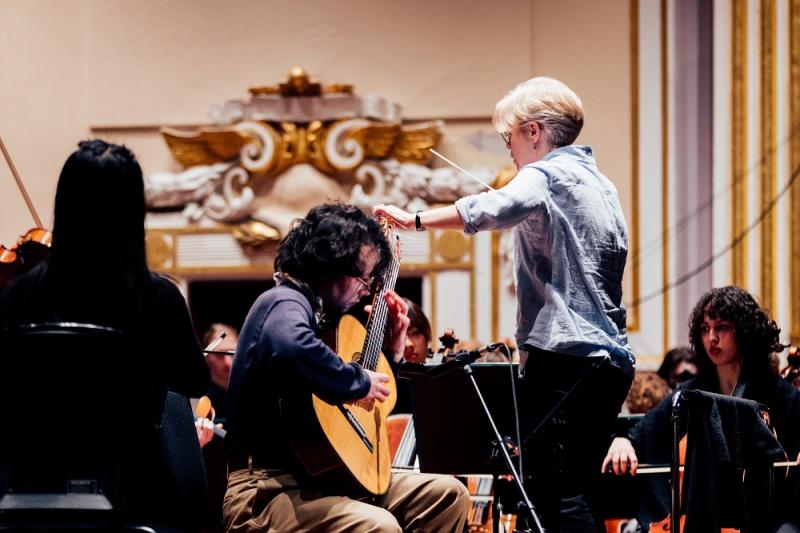 Copland’s Third doesn’t add up for me. It was splendidly done under Carlos Miguel Prieto, but how I’d love to have heard the National Youth Orchestra of Scotland in Mahler’s Seventh Symphony – a total revelation for Christopher Lambton. Good news that the vibrant conductor who got such results from a difficult start, Catherine Larsen Maguire, has been made the NYOS’s Music Director (rehearsal pictured above by Ryan Buchanan with Sean Shibe). Bernard Hughes’ favourite event of the year – “and I would call it an event rather than “just” a concert” - was the National Youth Choir’s 40th anniversary jamboree at the Albert Hall in April. It was slickly stage managed (often a problem at large scale events), with a brilliant range of repertoire and a heart-lifting celebration by singers from 9 to 25”.
Copland’s Third doesn’t add up for me. It was splendidly done under Carlos Miguel Prieto, but how I’d love to have heard the National Youth Orchestra of Scotland in Mahler’s Seventh Symphony – a total revelation for Christopher Lambton. Good news that the vibrant conductor who got such results from a difficult start, Catherine Larsen Maguire, has been made the NYOS’s Music Director (rehearsal pictured above by Ryan Buchanan with Sean Shibe). Bernard Hughes’ favourite event of the year – “and I would call it an event rather than “just” a concert” - was the National Youth Choir’s 40th anniversary jamboree at the Albert Hall in April. It was slickly stage managed (often a problem at large scale events), with a brilliant range of repertoire and a heart-lifting celebration by singers from 9 to 25”.
Should we feel guilty about musical joy and optimism given the overwhelming horrors around the world in 2023 (and ongoing)? Absolutely not – this is what we need, as Boyd Tonkin emphasised when “on a dark day, in a dark time for their region, Michael Barenboim brought to the South Bank the West-Eastern Divan Ensemble (pictured below by Pete Woodhead)– a chamber-sized spin-off from the bridge-building orchestra created by his father with Edward Said - and turned blissful Mendelssohn and Beethoven into a message of hope and joy”. 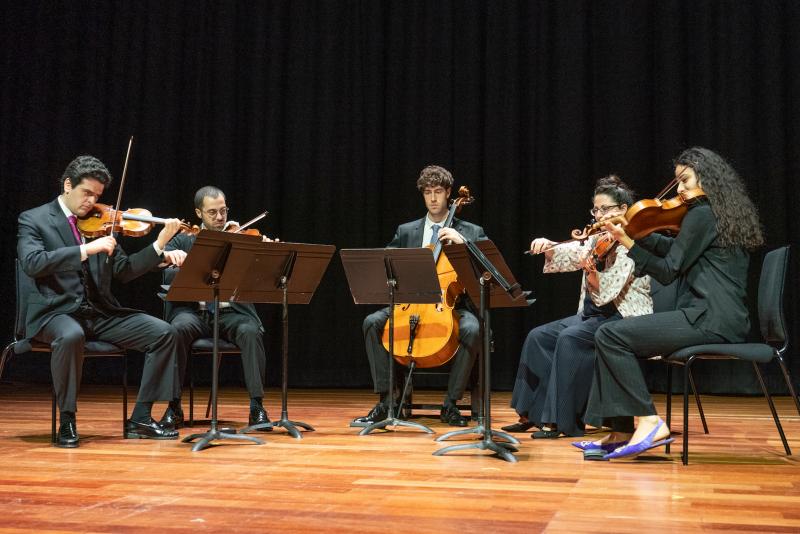 Boyd was also overjoyed by John Wilson’s Sinfonia of London super-band at the Aldeburgh Festival, “almost levitating Snape Maltings with magical Sally Beamish as well as scintillating Respighi and ravishing Rachmaninov”. My own time near the Suffolk Coast was marked out by a Ligeti day from the eponymous quartet which began in unusually sober, hardcore fashion, but culminated in a joyous celebration of no less than 14 new works homaging the great piano etudes in quartet form; this needs to be heard again with Rolf Hind, an all too brief participant, playing the originals.
Boyd was also overjoyed by John Wilson’s Sinfonia of London super-band at the Aldeburgh Festival, “almost levitating Snape Maltings with magical Sally Beamish as well as scintillating Respighi and ravishing Rachmaninov”. My own time near the Suffolk Coast was marked out by a Ligeti day from the eponymous quartet which began in unusually sober, hardcore fashion, but culminated in a joyous celebration of no less than 14 new works homaging the great piano etudes in quartet form; this needs to be heard again with Rolf Hind, an all too brief participant, playing the originals.
All our established orchestras shone. Robert Beale was lucky to experience The Dream of Gerontius, The Apostles and The Kingdom, the last two on consecutive days, from Mark Elder and the Hallé at Manchester’s Bridgewater Hall (pictured below by Tom Stephens): “a feast of Elgar and one of those landmarks in music making that will be long remembered.” 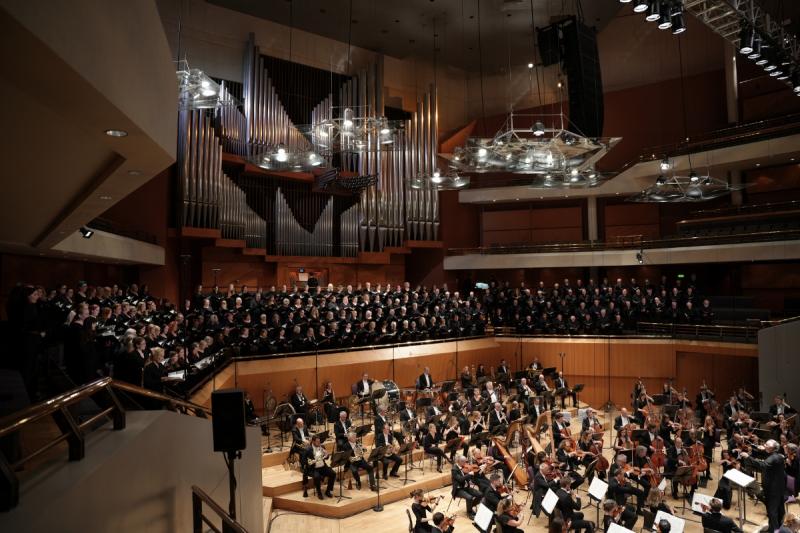 Rachmaninov was feted in his anniversary year with numerous performances of the most famous concertos, but they’re canonical for a reason. Robert was deeply impressed by 75-year-old Garrick Ohlsson with the BBC Philharmonic and John Storgårds playing the Third Piano Concerto “with consummate skill, complete control of all its demands and creating something of great musical beauty”.
Rachmaninov was feted in his anniversary year with numerous performances of the most famous concertos, but they’re canonical for a reason. Robert was deeply impressed by 75-year-old Garrick Ohlsson with the BBC Philharmonic and John Storgårds playing the Third Piano Concerto “with consummate skill, complete control of all its demands and creating something of great musical beauty”.
I was equally struck by the freshly-minted perfection of Nikolay Lugansky in the even more ubiquitous Second. He was partnered with exceptional sensitivity by Vasily Petrenko and the Royal Philharmonic Orchestra, whose Elgar First Symphony was what I’d gone to hear – no disappointment there, and Lera Auerbach’s Icarus made for a dazzling start. I was also at the Cadogan Hall for the back-on-form RPO, nominally to support two musician proteges of my guest, but this was no B-grade event; it included the most ravishing Debussy Prélude à l'après-midi d'un faune I’ve ever heard, perfectly handled by conducting talent new to me, Elena Schwarz (pictured below). 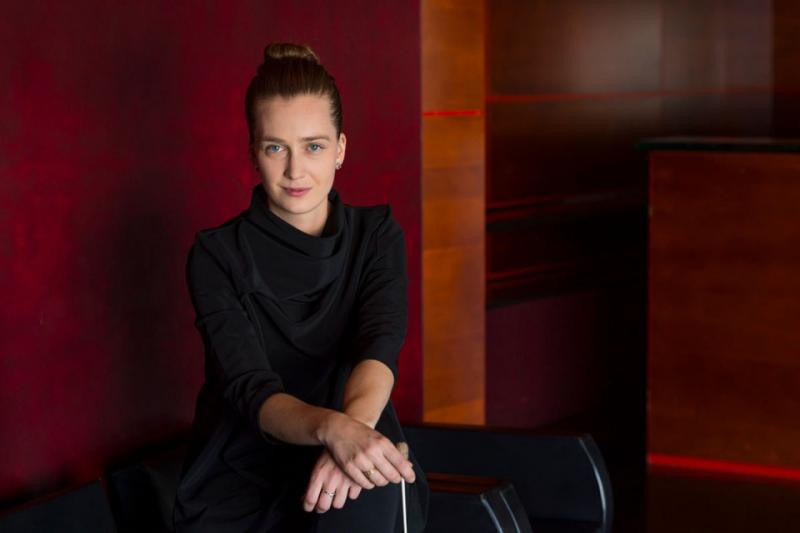 The LSO's outgoing master Simon Rattle deserves our gratitude for highlighting "the proposed vandalism by the BBC, of which the closure of the BBC Singers was only the tip of the iceberg" in a speech to a packed Barbican Hall and inviting them to blaze after his Mahler 7 with Poulenc's Figure Humaine (it shows what public pressure can do - the Singers have been reprived. Rattle and the BBC Singers pictured below by Mark Allan). Antonio Pappano, the orchestra's principal conductor designate of the LSO, turned Richard Strauss’s Ein Heldenleben into a hallucinogenic, often hilarious opera for orchestra only 10 days after the equally brilliant musician due to take over from him at the Royal Opera, Jakub Hrůša, conducted the Philharmonia in a Don Juan to die for. And while the NYO’s Zarathustra had been brilliant, Venezuelan Diego Matheuz made the National Symphony Orchestra of Ireland sound like the Berlin Philharmonic under Karajan in it. This concert was also remarkable for reminding many of us who’d forgotten what a first-rate concerto is Bernstein’s Serenade ("after Plato’s Symposium"); Baiba Skride, long-term collaborator with an orchestra the UK doesn’t know enough about, brought every chameleonic, communicative skill to bear on it.
The LSO's outgoing master Simon Rattle deserves our gratitude for highlighting "the proposed vandalism by the BBC, of which the closure of the BBC Singers was only the tip of the iceberg" in a speech to a packed Barbican Hall and inviting them to blaze after his Mahler 7 with Poulenc's Figure Humaine (it shows what public pressure can do - the Singers have been reprived. Rattle and the BBC Singers pictured below by Mark Allan). Antonio Pappano, the orchestra's principal conductor designate of the LSO, turned Richard Strauss’s Ein Heldenleben into a hallucinogenic, often hilarious opera for orchestra only 10 days after the equally brilliant musician due to take over from him at the Royal Opera, Jakub Hrůša, conducted the Philharmonia in a Don Juan to die for. And while the NYO’s Zarathustra had been brilliant, Venezuelan Diego Matheuz made the National Symphony Orchestra of Ireland sound like the Berlin Philharmonic under Karajan in it. This concert was also remarkable for reminding many of us who’d forgotten what a first-rate concerto is Bernstein’s Serenade ("after Plato’s Symposium"); Baiba Skride, long-term collaborator with an orchestra the UK doesn’t know enough about, brought every chameleonic, communicative skill to bear on it. 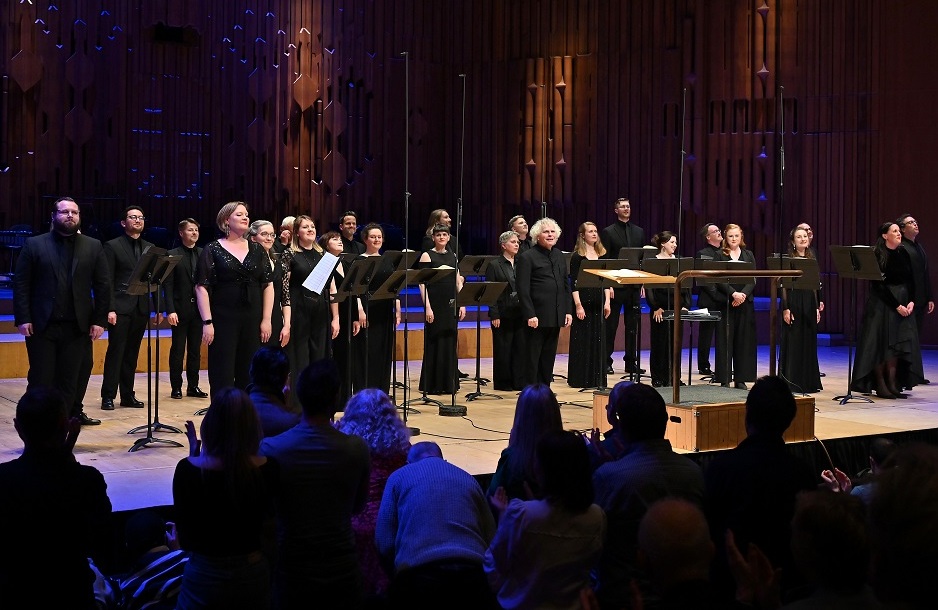
Skride’s Bernsteinfest apart, violin concerto performance of the year must go to Janine Jansen in the Sibelius with the LSO and Gianandrea Noseda – I heard equal words of wonder about another occasion when she’d played it. Sebastian waxed superlative about her, and above all pianist Denis Kozhukhin, in one of the last Wigmore Hall performances of the year. Sebastian also loved a recital by Yevgeny Sudbin, one of the very first events at World Heart Beat Embassy Gardens, "an intimate space which is a great addition to the London scene". 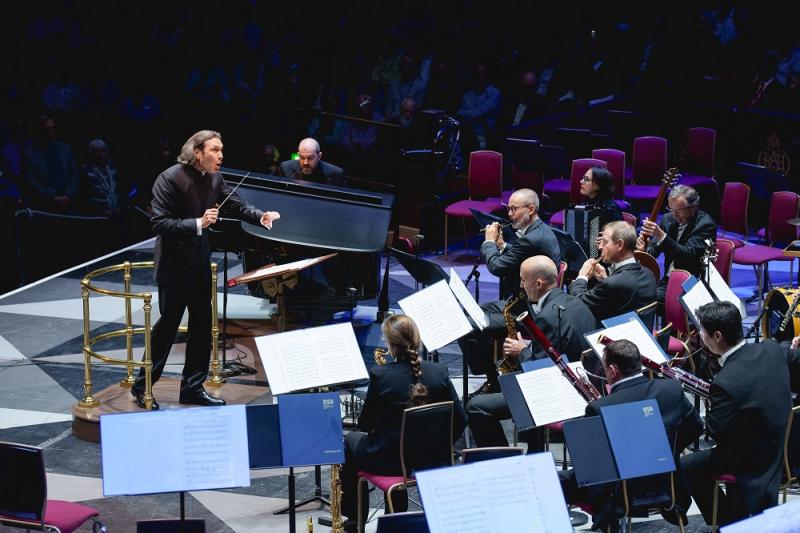 Forgive me if I stick to well-trod Wigmore paths, but Elisabeth Leonskaja’s Brahms this year never disappointed, and her trilogy of early piano sonatas joined earlier Schubert and Beethoven epics in the pantheon of great playing. Youthful daring came from the Castalian Quartet: the second instalment of their Britten series dared to follow the Second Quartet and its big Chaconne with Beethoven’s Op. 130, original Grosse Fuge finale included.
Forgive me if I stick to well-trod Wigmore paths, but Elisabeth Leonskaja’s Brahms this year never disappointed, and her trilogy of early piano sonatas joined earlier Schubert and Beethoven epics in the pantheon of great playing. Youthful daring came from the Castalian Quartet: the second instalment of their Britten series dared to follow the Second Quartet and its big Chaconne with Beethoven’s Op. 130, original Grosse Fuge finale included.
On the song recital front, programmes don’t get any more revelatory than the one I travelled to the Oxford International Song Festival to hear – Christine Rice, a mezzo of infinite resources, perfectly partnered by Julius Drake in a stunning Haydn mini-opera plus songs by the also underrated Rebecca Clarke interwoven with viola pieces played by the superb Timothy Ridout. What a lovely way to end, too, with the Brahms' "Geistliches Wiegenlied". Unexpected bonus was an earlier tribute to artist Tom Phillips, true Oxford spirit who died this year; as well as learning about his range with some amazement, I also heard perfect songs from young soprano Clara Barbier Serrano and pianist.Joanna Kacperek. A chance conversation on the tube home led me to Barbier Serrano’s beguiling tribute to Irish writers in Dublin with saxophonist Robert Finegan and pianist Tianqi Ling. Here’s another imaginative artist who deserves to go far.  The context, that of the Bloomsbury Festival, was less than happy for those involved, and I never got the promised publicity photos. No such quibbles over Ensemble 360’s Sheffield Chamber Music Festival, my first experience of both the cornucopia (players in the round at the Crucible's second space pictured above) and the fascinating city. Engaging, natural communicator Kathryn Stott had curated brilliantly, and the opening concert was sheer joy from Martinů’s La revue de cuisine and trumpeter Tina Thing Helseth’s Weill transcriptions to Saint-Saëns’ bracing, healthy Septet.
The context, that of the Bloomsbury Festival, was less than happy for those involved, and I never got the promised publicity photos. No such quibbles over Ensemble 360’s Sheffield Chamber Music Festival, my first experience of both the cornucopia (players in the round at the Crucible's second space pictured above) and the fascinating city. Engaging, natural communicator Kathryn Stott had curated brilliantly, and the opening concert was sheer joy from Martinů’s La revue de cuisine and trumpeter Tina Thing Helseth’s Weill transcriptions to Saint-Saëns’ bracing, healthy Septet.
Handel is like Wagner: without a uniformly world-class team of soloists, not to mention a lively orchestra, small choir and conducting, his works can drag for those of us outside the charmed circle. But there was no danger of that in the English Baroque Soloists/Monteverdi Choir performance of perhaps his most charming masterpiece of light and shade, L’Allegro, Il Penseroso ed il Moderato in lovely St Martin-in-the-Fields. Of the two superb main sopranos, Hilary Cronin and Samantha Clarke, Cronin had already been part of another unsurpassable team in the Irish Baroque Orchestra’s pocket Wigmore Messiah: even given conductor Peter Whelan’s expected inspirational touch, this had a very special incandescent flow, and there were regrets that microphones hadn’t been there to catch it; still, the recording due to be made next year will be well worth waiting for. Closer to an operatic experience was In the Realms of Sorrow, which, as a smitten Rachel Halliburton told us, "took four of the composer’s early cantatas about thwarted love and mined them for all their incandescent rage and poisoned wistfulness"..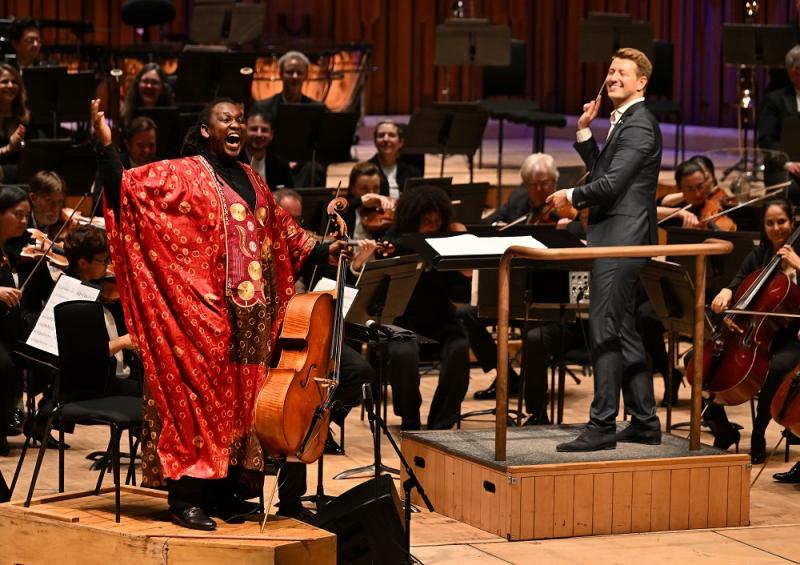
Explore topics
Share this article
Add comment
The future of Arts Journalism
You can stop theartsdesk.com closing!
We urgently need financing to survive. Our fundraising drive has thus far raised £49,000 but we need to reach £100,000 or we will be forced to close. Please contribute here: https://gofund.me/c3f6033d
And if you can forward this information to anyone who might assist, we’d be grateful.

Subscribe to theartsdesk.com
Thank you for continuing to read our work on theartsdesk.com. For unlimited access to every article in its entirety, including our archive of more than 15,000 pieces, we're asking for £5 per month or £40 per year. We feel it's a very good deal, and hope you do too.
To take a subscription now simply click here.
And if you're looking for that extra gift for a friend or family member, why not treat them to a theartsdesk.com gift subscription?
more Classical music
 Robin Holloway: Music's Odyssey review - lessons in composition
Broad and idiosyncratic survey of classical music is insightful but slightly indigestible
Robin Holloway: Music's Odyssey review - lessons in composition
Broad and idiosyncratic survey of classical music is insightful but slightly indigestible
 Classical CDs: Wolf-pelts, clowns and social realism
British ballet scores, 19th century cello works and contemporary piano etudes
Classical CDs: Wolf-pelts, clowns and social realism
British ballet scores, 19th century cello works and contemporary piano etudes
 Bizet in 150th anniversary year: rich and rare French offerings from Palazzetto Bru Zane
Specialists in French romantic music unveil a treasure trove both live and on disc
Bizet in 150th anniversary year: rich and rare French offerings from Palazzetto Bru Zane
Specialists in French romantic music unveil a treasure trove both live and on disc
 Scottish Chamber Orchestra, Ibragimova, Queen’s Hall, Edinburgh review - rarities, novelties and drumrolls
A pity the SCO didn't pick a better showcase for a shining guest artist
Scottish Chamber Orchestra, Ibragimova, Queen’s Hall, Edinburgh review - rarities, novelties and drumrolls
A pity the SCO didn't pick a better showcase for a shining guest artist
 Kilsby, Parkes, Sinfonia of London, Wilson, Barbican review - string things zing and sing in expert hands
British masterpieces for strings plus other-worldly tenor and horn - and a muscular rarity
Kilsby, Parkes, Sinfonia of London, Wilson, Barbican review - string things zing and sing in expert hands
British masterpieces for strings plus other-worldly tenor and horn - and a muscular rarity
 From Historical to Hip-Hop, Classically Black Music Festival, Kings Place review - a cluster of impressive stars for the future
From quasi-Mozartian elegance to the gritty humour of a kitchen inspection
From Historical to Hip-Hop, Classically Black Music Festival, Kings Place review - a cluster of impressive stars for the future
From quasi-Mozartian elegance to the gritty humour of a kitchen inspection
 Shibe, LSO, Adès, Barbican review - gaudy and glorious new music alongside serene Sibelius
Adès’s passion makes persuasive case for the music he loves, both new and old
Shibe, LSO, Adès, Barbican review - gaudy and glorious new music alongside serene Sibelius
Adès’s passion makes persuasive case for the music he loves, both new and old
 Anja Mittermüller, Richard Fu, Wigmore Hall review - a glorious hall debut
The Austrian mezzo shines - at the age of 22
Anja Mittermüller, Richard Fu, Wigmore Hall review - a glorious hall debut
The Austrian mezzo shines - at the age of 22
 First Person: clarinettist Oliver Pashley on the new horizons of The Hermes Experiment's latest album
Compositions by members of this unusual quartet feature for the first time
First Person: clarinettist Oliver Pashley on the new horizons of The Hermes Experiment's latest album
Compositions by members of this unusual quartet feature for the first time
 Gesualdo Passione, Les Arts Florissants, Amala Dior Company, Barbican review - inspired collaboration excavates the music's humanity
At times it was like watching an anarchic religious procession
Gesualdo Passione, Les Arts Florissants, Amala Dior Company, Barbican review - inspired collaboration excavates the music's humanity
At times it was like watching an anarchic religious procession
 Classical CDs: Camels, concrete and cabaret
An influential American composer's 90th birthday box, plus British piano concertos and a father-and-son duo
Classical CDs: Camels, concrete and cabaret
An influential American composer's 90th birthday box, plus British piano concertos and a father-and-son duo
 Cockerham, Manchester Camerata, Sheen, Martin Harris Centre, Manchester review - re-enacting the dawn of modernism
Two UK premieres added to three miniatures from a seminal event of January 1914
Cockerham, Manchester Camerata, Sheen, Martin Harris Centre, Manchester review - re-enacting the dawn of modernism
Two UK premieres added to three miniatures from a seminal event of January 1914

Comments
Aren't we lucky to hear such
Aren't we lucky to hear such superb young talent!
We are indeed - the music
We are indeed - the music colleges are something to be proud of, organisations like NYOGB, and then the enterprise in concert-giving of the younger generations.